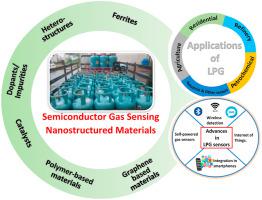Analytica Chimica Acta ( IF 6.2 ) Pub Date : 2023-03-07 , DOI: 10.1016/j.aca.2023.341033 B C Tladi 1 , R E Kroon 1 , H C Swart 1 , D E Motaung 1

|
Liquefied petroleum gas (LPG), which is mainly composed of hydrocarbons, such as propane and butane, is a flammable gas that is considered a clean source of energy. Currently, the overwhelming use of LPG as fuel in vehicles, domestic settings, and industry has led to several incidents and deaths globally due to leakage. As a result, the appropriate detection of LPG is vital; thus, gas-sensing devices that can monitor this gas rapidly and accurately at room temperature, are required. This work reviews the current advances in LPG gas sensors, which operate at room temperature. The influences of the synthesis methods and parameters, doping, and use of catalysts on the sensing performance are discussed. The formation of heterostructures made from semiconducting metal oxides, polymers, and graphene-based materials, which enhance the sensor selectivity and sensitivity, is also discussed. The future trends and challenges confronted in the advancement of LPG room temperature operational gas sensors, and critical ideas concerning the future evolution of LPG gas sensors, are deliberated. Additionally, the advancements in the next-generation gas sensors, such as the wireless detection of LPG leakage, self-powered sensors driven by triboelectric/piezoelectric mechanisms, and artificial intelligent systems are also reviewed. This review further focuses on the use of smartphones to circumvent the use of costly instruments and paves the way for cost-efficient and portable monitoring of LPG. Finally, the approach of utilizing the Internet of Things (IoT) to detect/monitor the leakage of LPG has also been discussed, which will provide better alerts to the users and thus minimize the effects of leakages.
中文翻译:

对高精度室温液化石油气传感器的最新趋势、进展和挑战的全面回顾
液化石油气 (LPG) 主要由碳氢化合物组成,例如丙烷和丁烷,是一种被认为是清洁能源的易燃气体。目前,在车辆、家庭环境和工业中大量使用液化石油气作为燃料已导致全球发生多起泄漏事故和死亡事故。因此,适当检测液化石油气至关重要;因此,需要能够在室温下快速准确地监测这种气体的气体传感装置。这项工作回顾了在室温下工作的 LPG 气体传感器的当前进展。讨论了合成方法和参数、掺杂和催化剂的使用对传感性能的影响。由半导体金属氧化物、聚合物和石墨烯基材料制成的异质结构的形成,还讨论了增强传感器选择性和灵敏度的方法。讨论了 LPG 室温操作气体传感器的未来发展趋势和面临的挑战,以及有关 LPG 气体传感器未来发展的关键思想。此外,还回顾了下一代气体传感器的进展,例如液化石油气泄漏的无线检测、摩擦电/压电机制驱动的自供电传感器以及人工智能系统。本综述进一步侧重于使用智能手机来规避昂贵仪器的使用,并为液化石油气的成本效益和便携式监测铺平道路。最后,还讨论了利用物联网 (IoT) 检测/监测液化石油气泄漏的方法,


























 京公网安备 11010802027423号
京公网安备 11010802027423号